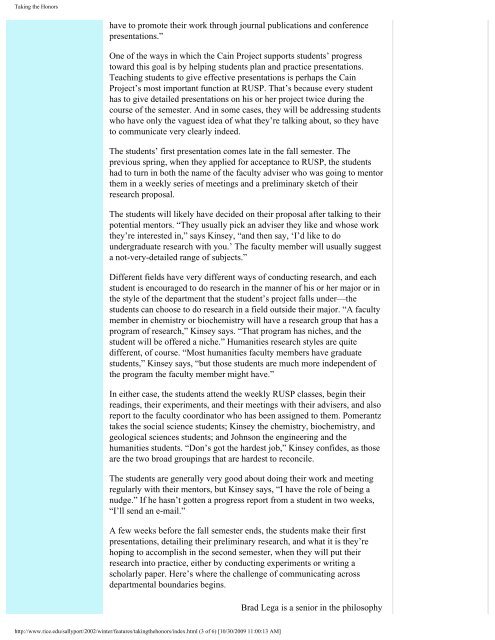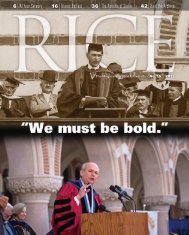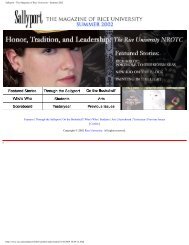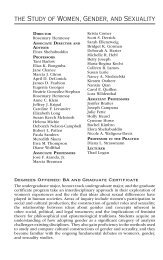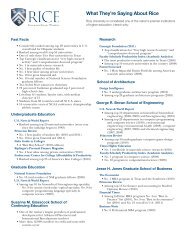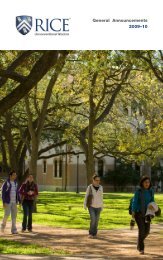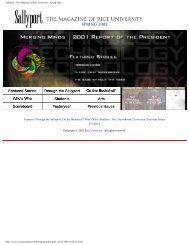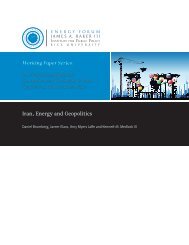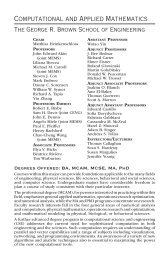Sallyport - The Magazine of Rice University - Winter 2002
Sallyport - The Magazine of Rice University - Winter 2002
Sallyport - The Magazine of Rice University - Winter 2002
You also want an ePaper? Increase the reach of your titles
YUMPU automatically turns print PDFs into web optimized ePapers that Google loves.
Taking the Honors<br />
have to promote their work through journal publications and conference<br />
presentations.”<br />
One <strong>of</strong> the ways in which the Cain Project supports students’ progress<br />
toward this goal is by helping students plan and practice presentations.<br />
Teaching students to give effective presentations is perhaps the Cain<br />
Project’s most important function at RUSP. That’s because every student<br />
has to give detailed presentations on his or her project twice during the<br />
course <strong>of</strong> the semester. And in some cases, they will be addressing students<br />
who have only the vaguest idea <strong>of</strong> what they’re talking about, so they have<br />
to communicate very clearly indeed.<br />
<strong>The</strong> students’ first presentation comes late in the fall semester. <strong>The</strong><br />
previous spring, when they applied for acceptance to RUSP, the students<br />
had to turn in both the name <strong>of</strong> the faculty adviser who was going to mentor<br />
them in a weekly series <strong>of</strong> meetings and a preliminary sketch <strong>of</strong> their<br />
research proposal.<br />
<strong>The</strong> students will likely have decided on their proposal after talking to their<br />
potential mentors. “<strong>The</strong>y usually pick an adviser they like and whose work<br />
they’re interested in,” says Kinsey, “and then say, ‘I’d like to do<br />
undergraduate research with you.’ <strong>The</strong> faculty member will usually suggest<br />
a not-very-detailed range <strong>of</strong> subjects.”<br />
Different fields have very different ways <strong>of</strong> conducting research, and each<br />
student is encouraged to do research in the manner <strong>of</strong> his or her major or in<br />
the style <strong>of</strong> the department that the student’s project falls under—the<br />
students can choose to do research in a field outside their major. “A faculty<br />
member in chemistry or biochemistry will have a research group that has a<br />
program <strong>of</strong> research,” Kinsey says. “That program has niches, and the<br />
student will be <strong>of</strong>fered a niche.” Humanities research styles are quite<br />
different, <strong>of</strong> course. “Most humanities faculty members have graduate<br />
students,” Kinsey says, “but those students are much more independent <strong>of</strong><br />
the program the faculty member might have.”<br />
In either case, the students attend the weekly RUSP classes, begin their<br />
readings, their experiments, and their meetings with their advisers, and also<br />
report to the faculty coordinator who has been assigned to them. Pomerantz<br />
takes the social science students; Kinsey the chemistry, biochemistry, and<br />
geological sciences students; and Johnson the engineering and the<br />
humanities students. “Don’s got the hardest job,” Kinsey confides, as those<br />
are the two broad groupings that are hardest to reconcile.<br />
<strong>The</strong> students are generally very good about doing their work and meeting<br />
regularly with their mentors, but Kinsey says, “I have the role <strong>of</strong> being a<br />
nudge.” If he hasn’t gotten a progress report from a student in two weeks,<br />
“I’ll send an e-mail.”<br />
A few weeks before the fall semester ends, the students make their first<br />
presentations, detailing their preliminary research, and what it is they’re<br />
hoping to accomplish in the second semester, when they will put their<br />
research into practice, either by conducting experiments or writing a<br />
scholarly paper. Here’s where the challenge <strong>of</strong> communicating across<br />
departmental boundaries begins.<br />
Brad Lega is a senior in the philosophy<br />
http://www.rice.edu/sallyport/<strong>2002</strong>/winter/features/takingthehonors/index.html (3 <strong>of</strong> 6) [10/30/2009 11:00:13 AM]


